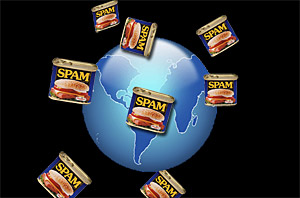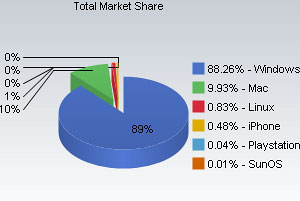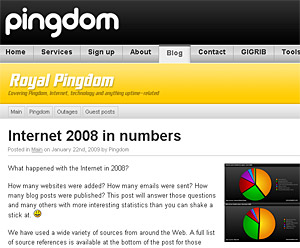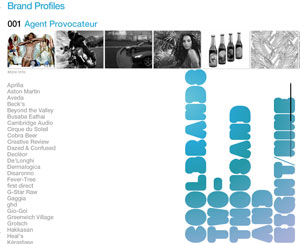 Spam, the scourge of the inbox, has bounced back to the same horrific high levels as five months ago according to anti-spam company Postini, a division of Google.
Spam, the scourge of the inbox, has bounced back to the same horrific high levels as five months ago according to anti-spam company Postini, a division of Google.
Back in November last year, spam levels registered a dramatic drop when Internet backbone providers cut off McColo Corp., a California Web-hosting service used by steenkin’ spammers to coordinate e-mail attacks.
 In the UK, it usually only takes about a nano-centimetre of snow to have the headlines blaring, “OMG! SNOW CHAOS!!!,” but in the last 24 hours parts of the country have suffered major snowfalls.
In the UK, it usually only takes about a nano-centimetre of snow to have the headlines blaring, “OMG! SNOW CHAOS!!!,” but in the last 24 hours parts of the country have suffered major snowfalls. January has proved to be a good start for Apple, with around 10 percent of Web users running the operating system, according to Web metrics company Net Applications.
January has proved to be a good start for Apple, with around 10 percent of Web users running the operating system, according to Web metrics company Net Applications. The British Library has expressed concerns that future historians may face a “black hole” of lost material unless urgent action is taken to archive contemporary websites and other digital records.
The British Library has expressed concerns that future historians may face a “black hole” of lost material unless urgent action is taken to archive contemporary websites and other digital records. Over 210 billion emails were sent every single day in 2008, according to recent research by the Web site performance business firm Pingdom.
Over 210 billion emails were sent every single day in 2008, according to recent research by the Web site performance business firm Pingdom. The total global online Internet audience has passed the one billion mark according to digital marketing intelligence provider, comScore.
The total global online Internet audience has passed the one billion mark according to digital marketing intelligence provider, comScore. Use of the mobile Internet is growing eight times faster than traffic to the PC-based web, with the number of Brits accessing the Internet from their mobile devices soaring by 25% in the third quarter of 2008, according to new research from stat-studying spods Nielsen Online.
Use of the mobile Internet is growing eight times faster than traffic to the PC-based web, with the number of Brits accessing the Internet from their mobile devices soaring by 25% in the third quarter of 2008, according to new research from stat-studying spods Nielsen Online. Suw looks into how humans (that’s us) become addicted to certain Web sites and services like email.
Suw looks into how humans (that’s us) become addicted to certain Web sites and services like email. YouTube has swiped aside Internet monsters Google and social networking phenomenon Facebook to win the honour of the ‘coolest online media brand’, according to this year’s CoolBrands survey.
YouTube has swiped aside Internet monsters Google and social networking phenomenon Facebook to win the honour of the ‘coolest online media brand’, according to this year’s CoolBrands survey. The creator of the World Wide Web has voiced his concerns that his invention is being used more and more to spread misleading information, rumours and bonkers conspiracy theories.
The creator of the World Wide Web has voiced his concerns that his invention is being used more and more to spread misleading information, rumours and bonkers conspiracy theories.